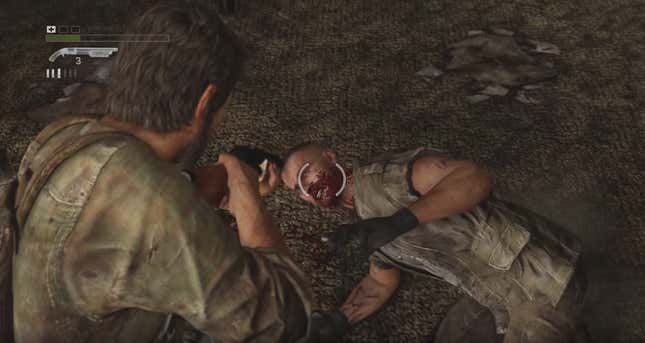
Like a lot of people who play video games, I have spent decades aiming at digital heads. I have also spent a considerable amount of time during those years feeling uncomfortable about it. “Headshots” as a concept are, as Kotaku’s Stephen Totilo wrote in a 2010 report, ghoulish to the outsider, and essential to the gamer.
Over the past couple days, I started watching YouTuber Jacob Geller’s video essays on games. “Rationalizing Brutality: The Cultural Legacy of the Headshot” is a good example of why I find them compelling. Geller constructs well-researched videos exploring a topic contextually, pulling not just from video games but across media, history, and current events.
Content Warning: the video references and depicts graphic violence from both games and historical footage.
“Rationalizing Brutality” is an even-keeled examination of the very idea of headshots, one that traces humankind’s understanding of the location of the “self.” In both medical science and popular culture, the “self” was thought to lie in the heart, but eventually our conception of where “we” are in our bodies drifted upward to the brain. Geller, citing numerous games and scholarly papers like Amanda Phillips’ “Shooting to Kill: Headshots, Twitch Reflexes, and the Mechropolitics of Video Games” ruminates on the much-discussed role of the headshot in game design, as well as the way it has slowly become the primary depiction of death by gunshot in popular culture.
What makes Geller’s video good isn’t that it’s arguing for or against gun violence in games, but rather what it might mean to have a large body of popular entertainment shift in a direction that specifically valorizes the headshot.
Committing acts of digital violence does not lead to a desire to commit real violence, but art does influence understanding. And if our current understanding of the self is something rooted in the brain, what does it mean to have all this media where the destruction of a head, and therefore arguably the self, is the primary thrill? And what should we make of it, when, say, we read the news and see that a police officer has shot someone in the head, a target that no soldier or law enforcement officer is trained to hit, with extreme exception?
These are difficult, powerful questions, and as Geller’s video shows, questions that games can also help us parse.